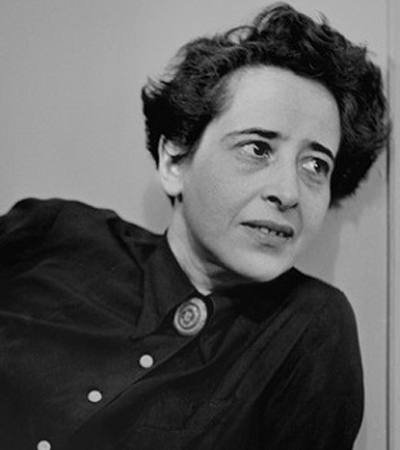
Biography
Hannah Arendt (1906–1975) was a political theorist best known for her provocative evaluations of the historical and intellectual roots of modern radicalism.
Hannah Arendt was born Johanna Cohn Arendt in Hanover, Germany, to middle-class, secularized Jewish parents of Russian descent. Arendt spent most of her youth in Königsberg, East Prussia. After her expulsion from the Luisenschule, a girl’s grammar school (for “insubordination”), Arendt enrolled at the University of Berlin to study classics and Christian theology, preparing for a more formal entrance to a university education.
From 1924 to 1929 Arendt studied with Martin Heidegger, Karl Jaspers, Rudolf Bultmann, and Edmund Husserl at universities in Marburg, Freiburg, and Heidelberg. In 1925, she began what would become a famous (or infamous) relationship with Heidegger—an episodic, sometimes-romantic involvement that lasted until her death. (After the Second World War Arendt helped introduce Heidegger’s work to the United States, a task that she also performed for the literary critic Walter Benjamin, among others.) In 1926, Arendt moved to Heidelberg to study with Karl Jaspers, with whom she completed her doctoral dissertation on the concept of love in Saint Augustine. In 1929, she received her Ph.D. and married Günther Stern, a journalist and philosopher.
In 1933, following Hitler’s rise to power, Arendt was arrested and interrogated by the Gestapo for gathering evidence of Nazi anti-Jewish propaganda at the Prussian State Library. After a brief imprisonment, Arendt duped the interrogator and fled with her mother to Paris, where her husband was then residing.
Joining other exiled Jews in France, Arendt began working for Jewish refugee organizations that encouraged emigration to Palestine and helped those living in exile. In 1936, shortly before her divorce from Stern, Arendt met Heinrich Blücher, who would become her second husband. In 1940, Arendt and Blücher (a Communist) escaped Nazi-occupied France and immigrated to New York.
Arendt’s career as a public writer began in 1941 in New York, where she was a weekly columnist for the Jewish, German-language weekly Aufbau. After the war, she became involved in the recovery and cataloging of Jewish cultural treasures, first as research director of the Conference on Jewish Relations and chief editor of Schocken Books (1944–1948), and then as executive director of Jewish Cultural Reconstruction (1949–1952).
Arendt’s direct involvement with Jewish programs ended when she became prominent following the publication of her first major book, The Origins of Totalitarianism (1951). Both acclaimed and controversial, Origins argues that communism and fascism share intellectual and historical roots. Many critics on the Left criticized the book for providing justifications for Western anti-communism.
Her second major (and most comprehensive) book of political thought, The Human Condition (1958), seeks to defend political activity against what she believed to be pernicious currents in mass society. Lectures that Arendt had delivered as a visiting professor at Princeton became the basis of On Revolution (1963), an analysis of the institutional and cultural preconditions for political freedom.
In 1961, Arendt traveled to Jerusalem to attend the trial of Adolf Eichmann, a ranking member of the SS who had organized many of the details and other elements of the Holocaust. First published in The New Yorker and then compiled in Eichmann in Jerusalem (1964), Arendt’s report was a source of deep contention and anger among both critics and erstwhile friends. Her account of the trial is most famous for her claim that Eichmann’s monstrosity represents the “banality of evil,” a bureaucratically unthinking and mundane application of modern technology. (By contrast, the most recent work on Eichmann for example, Bettina Stangneth’s Eichmann Before Jerusalem, makes evident Eichmann’s cunning, precision, and unrepentance.) Equally controversial were her claims about the actions of European Jewish leadership during the Nazi period.
Eichmann in Jerusalem was praised by several of Arendt’s friends, including Mary McCarthy, Daniel Bell, Bruno Bettleheim, Alfred Kazin, and Hans Morgenthau. Others, such as Norman Podhoretz, Irving Howe, Lionel Abel, and Walter Laqueur regarded the book as historically flawed and tendentious. Her correspondence and friendship with Gershom Scholem soon ended after the German-born historian and kabbalist accused her of having “no love for the Jewish people”—an accusation that Arendt considered a compliment. Ultimately, the controversy surrounding the trial of Eichmann advanced Arendt’s career. She became a lecturer at the University of Chicago’s Committee on Social Thought (1963–1967) and the New School for Social Research in New York City (1967–1975).
She began work on her final study, The Life of the Mind, and died in 1975.
Assessments of Arendt’s intellectual standing have been mixed, with leading intellectual and literary figures after the Second World War counting among her admirers and detractors. Politically, Arendt opposed Communism and held academically unfashionable views of the Third World and certain civil rights issues. However, Arendt’s judgment of the United States was far from wholly positive. She believed that Senator Joseph McCarthy had a good chance of rising to the presidency and, at one point, considered moving to Switzerland. Arendt basically sympathized with the political Left, supporting demonstrations against the Vietnam War, and sometimes arguing that American anti-communist foreign policy was undertaken in large part for domestic and economic reasons. Not surprisingly, many of her current admirers are on the Left. Moreover, although Arendt was not a feminist, she came to receive significant scholarly and biographical attention because she was a leading intellectual figure in a world that was then largely dominated by men.
